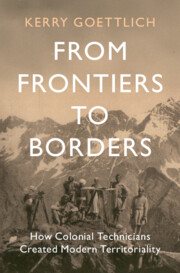Refine search
Actions for selected content:
245 results
12 - The Structure of the Anti-corruption Field
- from Part III - Mobilization
-
-
- Book:
- A Comparative Historical Sociology of Corruption
- Published online:
- 19 December 2025
- Print publication:
- 22 January 2026, pp 231-251
-
- Chapter
- Export citation
Chapter 4 - Governing the Fens
- from Part I - Scales of Action
-
- Book:
- Violent Waters
- Published online:
- 17 December 2025
- Print publication:
- 08 January 2026, pp 90-120
-
- Chapter
- Export citation
4 - Varieties of Expertise
-
- Book:
- Negotiating Values
- Published online:
- 30 November 2025
- Print publication:
- 18 December 2025, pp 76-99
-
- Chapter
- Export citation
Taking back control: maintaining professional autonomy as psychiatrists
-
- Journal:
- The British Journal of Psychiatry , FirstView
- Published online by Cambridge University Press:
- 04 December 2025, pp. 1-2
-
- Article
-
- You have access
- HTML
- Export citation
Science advising and democracy: Governing gene editing technologies
-
- Journal:
- Politics and the Life Sciences , First View
- Published online by Cambridge University Press:
- 02 December 2025, pp. 1-16
-
- Article
-
- You have access
- Open access
- HTML
- Export citation
‘It wasn’t the fire. It was the state’: the role of relational listening in state and institutional accountability
-
- Journal:
- International Journal of Law in Context / Volume 21 / Issue 4 / December 2025
- Published online by Cambridge University Press:
- 02 December 2025, pp. 659-672
-
- Article
-
- You have access
- Open access
- HTML
- Export citation

Negotiating Values
- Implementing Change in the Allocation of Transplant Organs
-
- Published online:
- 30 November 2025
- Print publication:
- 18 December 2025
The Emergent Basis of Expert Trust
-
- Journal:
- Philosophy of Science / Accepted manuscript
- Published online by Cambridge University Press:
- 24 November 2025, pp. 1-15
-
- Article
-
- You have access
- Export citation
11 - Becoming a Professional
- from Part III - Career
-
- Book:
- The Artist's Life
- Published online:
- 04 November 2025
- Print publication:
- 20 November 2025, pp 71-78
-
- Chapter
- Export citation
Failure-proof or failure-prone? The paradoxes of global biodiversity institutions
-
- Journal:
- Review of International Studies , First View
- Published online by Cambridge University Press:
- 13 November 2025, pp. 1-21
-
- Article
-
- You have access
- Open access
- HTML
- Export citation
6 - The Paris Peace Conference
-
- Book:
- From Frontiers to Borders
- Published online:
- 23 October 2025
- Print publication:
- 06 November 2025, pp 186-216
-
- Chapter
- Export citation

From Frontiers to Borders
- How Colonial Technicians Created Modern Territoriality
-
- Published online:
- 23 October 2025
- Print publication:
- 06 November 2025
Wiser Together: Toward a Theory of Epistemic Reputation
-
- Journal:
- Episteme , First View
- Published online by Cambridge University Press:
- 20 October 2025, pp. 1-21
-
- Article
-
- You have access
- Open access
- HTML
- Export citation
Chapter 7 - An Apparatus for Cognition
- from Part II - A Kantian Account of Thought Experiment
-
- Book:
- Kierkegaard and the Structure of Imagination
- Published online:
- 26 September 2025
- Print publication:
- 16 October 2025, pp 107-118
-
- Chapter
- Export citation
17 - PMCs Unite?
- from Part Three - Tenure’s Labor
-
- Book:
- The War on Tenure
- Published online:
- 30 September 2025
- Print publication:
- 30 September 2025, pp 146-154
-
- Chapter
- Export citation
The Doctors and the Party: Medicine, Politics, and the Habitus of Socialist Experts in the German Democratic Republic
-
- Journal:
- Central European History , First View
- Published online by Cambridge University Press:
- 09 September 2025, pp. 1-18
-
- Article
-
- You have access
- Open access
- HTML
- Export citation
A reappraisal of deference to expert regulators in light of the end of the Chevron doctrine
-
- Journal:
- Legal Studies / Volume 45 / Issue 3 / September 2025
- Published online by Cambridge University Press:
- 20 November 2025, pp. 414-431
- Print publication:
- September 2025
-
- Article
-
- You have access
- Open access
- HTML
- Export citation
Chapter 4 - Understanding the Flaws of Experience and Memory
-
- Book:
- Knowledge Doesn't Exist and Other Thoughts on Critical Thinking
- Published online:
- 22 October 2025
- Print publication:
- 21 August 2025, pp 46-62
-
- Chapter
- Export citation
4 - Craft, Creativity, and Distinction
-
- Book:
- The Language Work of Speechwriters
- Published online:
- 31 October 2025
- Print publication:
- 14 August 2025, pp 108-133
-
- Chapter
- Export citation
Gender Representation in Expert Advisory Bodies: Evidence from Norway
-
- Journal:
- Politics & Gender , First View
- Published online by Cambridge University Press:
- 06 August 2025, pp. 1-29
-
- Article
-
- You have access
- Open access
- HTML
- Export citation
